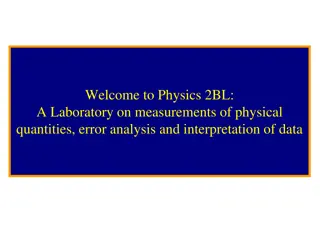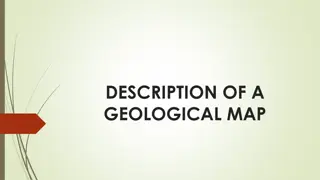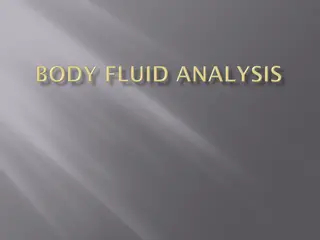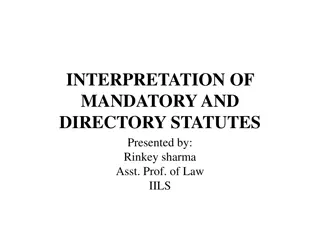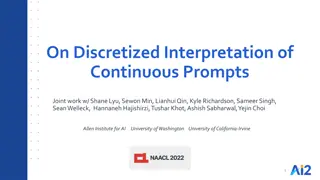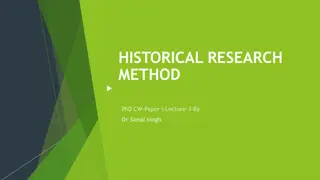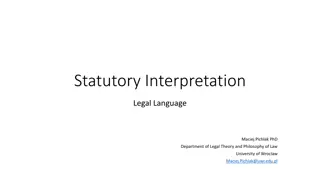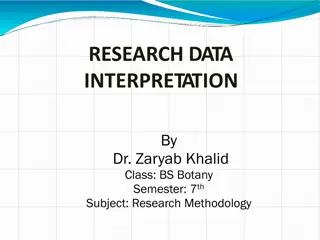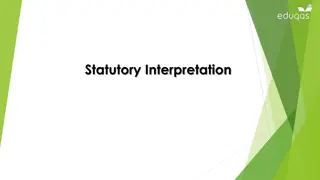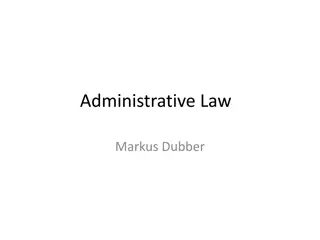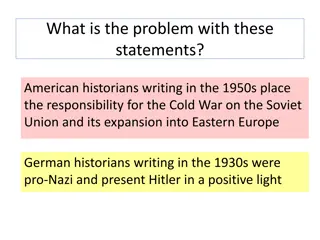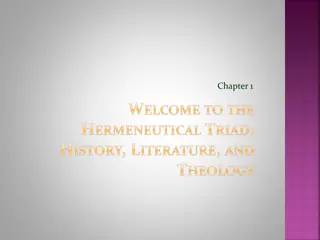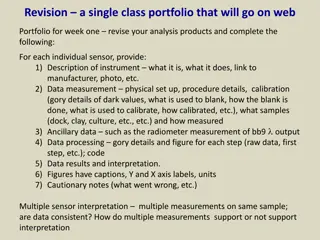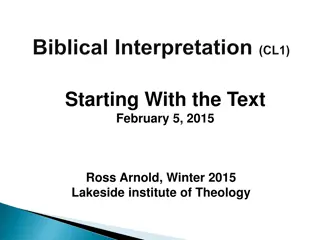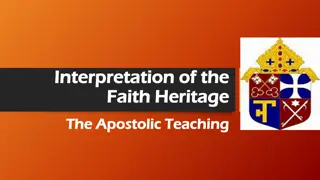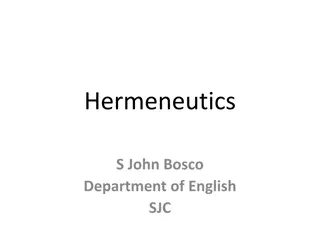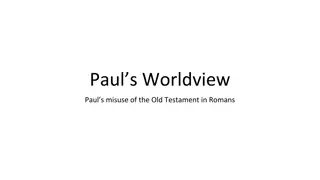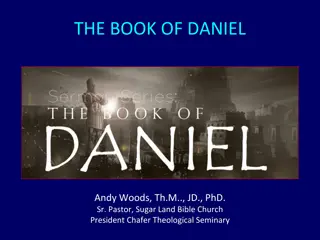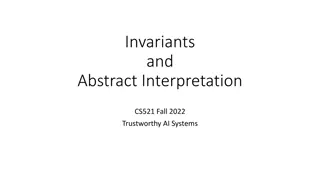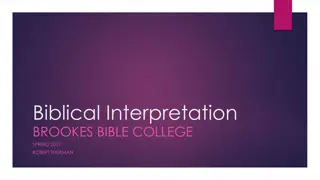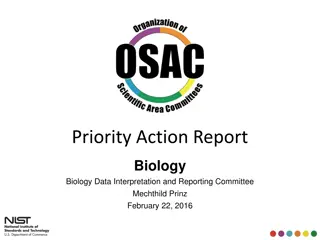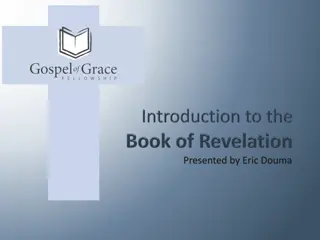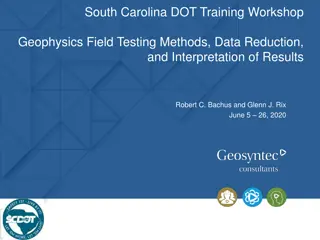Historical Sources as Evidence
Explore the importance of historical sources as evidence in the Victorian Curriculum History context, focusing on how students analyze, evaluate, and utilize sources to create historical explanations and arguments. Discover the significance of primary and secondary sources, perspectives of historica
1 views • 46 slides
Interpretation of Statutes and Articles: Taxation, Corporate Laws, Writ Remedies
Understanding the interpretation of statutes, articles of the Indian Constitution in relation to taxation, corporate laws for practicing members, and utilizing writ remedies before the High Court and Supreme Court. Exploring the scope of writs for enforcing fundamental rights, constitutional rights,
10 views • 38 slides
Understanding Drug Testing: Insights and Considerations
Drug testing interpretation is not always straightforward as the correlation between drug levels and impairment varies. Different types of tests, such as EMIT and GC/MS, provide different levels of detail and accuracy. Cut-off values are specified by SAMSHA, and testing for alcohol can be subject to
8 views • 25 slides
Interpretation
Interpretation in research methodology involves drawing inferences from collected data, establishing continuity in research, and developing explanatory concepts for future studies. It helps researchers understand abstract principles, make predictions, and maintain research continuity. Interpretation
4 views • 5 slides
Model evaluation strategy impacts the interpretation and performance of machine learning models
The evaluation strategy used for machine learning models significantly impacts their interpretation and performance. This study explores different evaluation methods and their implications for understanding climate-crop dynamics using explainable machine learning approaches. The strategy involves tr
6 views • 16 slides
Physics 2BL Laboratory: Measurements, Error Analysis & Data Interpretation
This Physics 2BL laboratory course focuses on measurements of physical quantities, error analysis, and interpretation of data. Students learn how scientists create models of natural phenomena and the practical aspects of conducting scientific experiments. Pre-requisites include Physics 2A, 4A or equ
0 views • 31 slides
Understanding Urinalysis: Importance and Interpretation
Urinalysis is a crucial diagnostic test used to detect various disorders like infections, kidney diseases, and diabetes by examining the physical, chemical, and microscopic properties of urine. It involves assessing color, specific gravity, and chemical content, such as pH and protein levels. The in
0 views • 22 slides
Challenges and Solutions in Implementing Historical Competencies in Teaching
Explore the complexities and obstacles faced in implementing historical competencies in teaching, as discussed by Jens Aage Poulsen, a senior lecturer and researcher at HistoryLab, University College Lillebaelt, Denmark. The content delves into competence-based curriculum, core historical competenci
0 views • 7 slides
Exploring Historical Fiction: Elements and Examples
Discover the essence of historical fiction, its key elements, and examples like "Forrest Gump." Learn how plausibility and interpretation play pivotal roles in creating captivating narratives that blend fiction with historical events.
0 views • 11 slides
Understanding Geological Maps: Interpretation and Description
Training in geological map interpretation aims to accurately identify features depicted on maps through careful examination of geological information. The description of a geological map involves a chronological synthesis of geological data, analysis of the geology of an area focusing on relief, suc
0 views • 15 slides
Understanding Cerebrospinal Fluid Analysis
Explore the essential aspects of cerebrospinal fluid (CSF) analysis, from routine laboratory assays to interpretation of pathological conditions. Learn about CSF formation, normal parameters, and interpretation of lab results to diagnose various neurological conditions.
0 views • 76 slides
Understanding Mandatory and Directory Statutes: A Legal Overview
Mandatory statutes compel specific actions with no discretion allowed, making non-compliance potentially void. Directory statutes outline procedures without affecting substantial rights, with compliance regarded as a matter of convenience. The interpretation of these statutes rests on legislative in
1 views • 18 slides
Exploring Discretized Interpretation of Continuous Prompts
Delve into the analysis of discrete text prompts and their interpretation of continuous prompts in AI research. The work explores sentiment analysis using pre-trained language models along with recent breakthroughs in spatial reasoning. Discover the challenges in interpreting and optimizing text pro
0 views • 21 slides
Understanding Potential Uplift Interpretation in ERCOT Protocols
ERCOT's Potential Uplift Interpretation Protocol defines Potential Uplift as the potential uplift to the Counter-Party based on short payments. The protocol outlines calculations and clarifies language ambiguity to ensure accurate interpretation. ERCOT seeks market feedback for further clarification
1 views • 6 slides
Understanding Literary Criticism: A Comprehensive Overview
Literary criticism involves the study, evaluation, and interpretation of literature, focusing on themes, styles, settings, and historical contexts. This discipline explores the meanings, workings, and values of literary works through interpretation, analysis, and evaluation. Various types of literar
2 views • 20 slides
Understanding Research Interpretation and Report Writing in Management Studies
Interpretation in research involves drawing inferences from collected facts to find broader meanings of findings. Techniques such as generalization, concept formulation, and consulting experts help ensure correct interpretation. Writing research reports is a crucial component, requiring logical anal
0 views • 25 slides
Understanding Historical Research Methods
Historical research is a systematic approach to investigating past events, developments, and experiences. It involves critical examination of evidence, interpretation of sources, and tracing of historical trends to gain insights into social changes. Various definitions by scholars like Kerlinger, Wh
1 views • 21 slides
Understanding Statutory Interpretation in Legal Context
Explore the intricacies of statutory interpretation, linguistic and non-linguistic methods, and types of interpretation in legal contexts. Uncover the significance of legal reasoning, historical perspectives, and comparisons between Anglo-Saxon and Continental legal cultures. Delve into the complexi
1 views • 17 slides
Understanding Historical Research: Methods, Purposes, and Aims
Historical research involves investigating past events systematically to provide a dynamic explanation, interpretation, and understanding of the past. It aims to uncover unknown aspects, answer unexplored questions, and link past happenings to the present to enrich human culture and encourage interd
0 views • 20 slides
Research Data Interpretation
Principles and methods of data interpretation in research, transitioning from data to knowledge through analysis and inference. Importance of proper interpretation for drawing accurate conclusions and enhancing the value of research findings.
0 views • 33 slides
Advanced Methods of Interpretation: Hermeneutics and Structuralism Lecture at Masaryk University
Understanding interpretation in cultural sociology through hermeneutics and structuralism is explored in Lecture III by Dr. Werner Binder at Masaryk University. The lecture delves into the art of interpretation, focusing on classical hermeneutics, Friedrich Schleiermacher's romantic hermeneutics, an
1 views • 37 slides
Understanding Interpretation Rules: Practical Examples and Exercises
Explore the importance of interpreting biblical passages in context, illustrated through examples like 1 John 3:6-10. Understand how historical and cultural background inform interpretation, emphasizing the need to consider surrounding text, book purpose, and broader biblical themes. Engage in exerc
0 views • 46 slides
Understanding Statutory Interpretation: Rules, Approaches, and Challenges
Explore the concept of statutory interpretation, including the intention of Parliament, problems that can arise, various rules and approaches used in interpretation, aids and presumptions, criticisms, and the relationship between statutory interpretation, EU law, and precedent. The Literal Rule, a c
2 views • 26 slides
Understanding Three Approaches to Statutory Interpretation in Administrative Law
Explore the concepts of Ordinary Meaning, Context, and Three Approaches to Statutory Interpretation in Administrative Law through insightful discussions and relevant examples. Gain a deeper understanding of legal interpretation principles and their application in legal frameworks.
1 views • 14 slides
Rethinking Historiography: Authorship, Evidence, and Interpretation
Examining the complexities of historical narratives, this content challenges simplistic analyses and emphasizes the importance of historian agency, evidence selection, and interpretation in shaping historical accounts.
1 views • 6 slides
Exploring Biblical Interpretation: History, Literature, and Theology
Delve into the importance of skilled biblical interpretation, the cost of failed interpretation, and the essential characteristics of a biblical interpreter. Understand the significance of humility, the role of the Spirit, and the need for accuracy in handling the Word of God. Learn about the hermen
0 views • 23 slides
Comprehensive Sensor Portfolio Analysis for Data Interpretation
This portfolio revision focuses on providing detailed descriptions and analysis of individual sensors for data collection and interpretation. It includes information on instrument specifications, data measurement setups, ancillary data, data processing steps, results interpretation, and cautionary n
0 views • 5 slides
Understanding Biblical Interpretation and Exegesis
Exploring the realms of biblical interpretation through exegesis, this content delves into the critical analysis of religious texts like the Bible. Unraveling the nuances of hermeneutics and exegesis, it emphasizes the importance of correct handling of the word of truth as prescribed in 2 Timothy 2:
0 views • 24 slides
Understanding the Role of Dogmas and Interpretation in Faith Heritage
The interpretation of faith heritage, apostolic teaching, and the role of dogmas in the Church form a foundation of belief that guides the spiritual journey. An authentic interpretation of God's Word is entrusted to the teaching office of the Church, emphasizing the connection between divine truths,
0 views • 9 slides
Understanding Hermeneutics: Exploring Interpretation and Meaning
Hermeneutics, a vital part of theology and philosophy, delves into understanding text and interpretation. Influenced by prominent thinkers like Heidegger and Ricoeur, it emphasizes the historical encounter and personal experience within the world. The concept of hermeneutical circle and the two area
0 views • 24 slides
The Interpretation of Messiah in Paul's Worldview
Paul's interpretation of the Old Testament in Romans is discussed regarding the portrayal of Jesus as Messiah. Scholars debate the alignment between the OT and NT perspectives on Messiah, exploring hermeneutics and biblical interpretation methods. The significance of understanding the Hebrew Bible's
0 views • 27 slides
Exploring The Book of Daniel: A Prophetic and Historical Overview
Delve into "The Book of Daniel" with Sr. Pastor Andy Woods as he provides insights into the prophetic and historical significance of this biblical text. Discover the revelations regarding the times of the Gentiles and the intricate layers of interpretation woven through the chapters. From the prophe
0 views • 118 slides
Understanding Invariants and Abstract Interpretation in Trustworthy AI Systems
Invariants and Abstract Interpretation are crucial concepts in building trustworthy AI systems. This involves defining configurations, concrete semantics, set semantics, and handling programs with loops. Monotonic functions play a vital role in ensuring consistency in the interpretation of these sys
0 views • 22 slides
Importance of Proper Hermeneutics in Biblical Interpretation
Hermeneutics, the science of biblical interpretation, is crucial in understanding and applying the Word of God accurately. It involves rules and methods to determine the intended meaning of the text. Proper hermeneutics ensures correct belief, application, and interpretation of the Bible while avoid
0 views • 170 slides
Forensic Biology Data Interpretation Committee Overview
The Biological Data Interpretation and Reporting Committee focuses on establishing best practices, guidelines, and standards for forensic DNA laboratory interpretation. Their goal is to ensure quality and consistency in the forensic community by standardizing scientifically valid methods of interpre
0 views • 26 slides
Workshop on Visual Christian Music Interpretation with Peggy Cobb
This workshop delves into the art of interpreting music visually, focusing on incorporating styles, rhythms, and presentation elements to convey the essence of a song in American Sign Language. Participants will explore modern and hymnal Christian music genres, alongside pop and country songs, to en
0 views • 15 slides
Debate on the Dating of the Book of Revelation and Its Interpretation
Dive into the various schools of interpretation for the Book of Revelation, ranging from Historical Premillennialism to Christian Reconstructionism. Explore the debate on the dating of Revelation, with evidence pointing to a possible date of 95 A.D. Uncover internal and external timing indicators ch
0 views • 30 slides
Developing Historical Thinking Skills in AP World History
AP History classes aim to cultivate apprentice historians by fostering historical thinking skills (HTS). These skills include Chronological Reasoning, Comparison and Contextualization, Crafting Historical Arguments, and Historical Interpretation. Each skill set equips students with the ability to an
0 views • 15 slides
Exploring Current Priorities in Pentecostal Theology and Hermeneutics
Delve into the nuanced approaches of interpreting Scripture within Pentecostal theology and evangelical historical contexts. Reflect on the role of the Spirit in illuminating the text and the potential pitfalls of subjective interpretation. Discover strategies to promote Spirit-inspired readings whi
0 views • 5 slides
Geophysics Field Testing Workshop: Methods and Interpretation
South Carolina DOT Training Workshop on geophysics field testing methods, data reduction, and interpretation of results by Robert C. Bachus and Glenn J. Rix. The workshop covers suspension logging, borehole geophysical logging, geotechnical testing, and geophysical service companies such as Schlumbe
0 views • 11 slides





